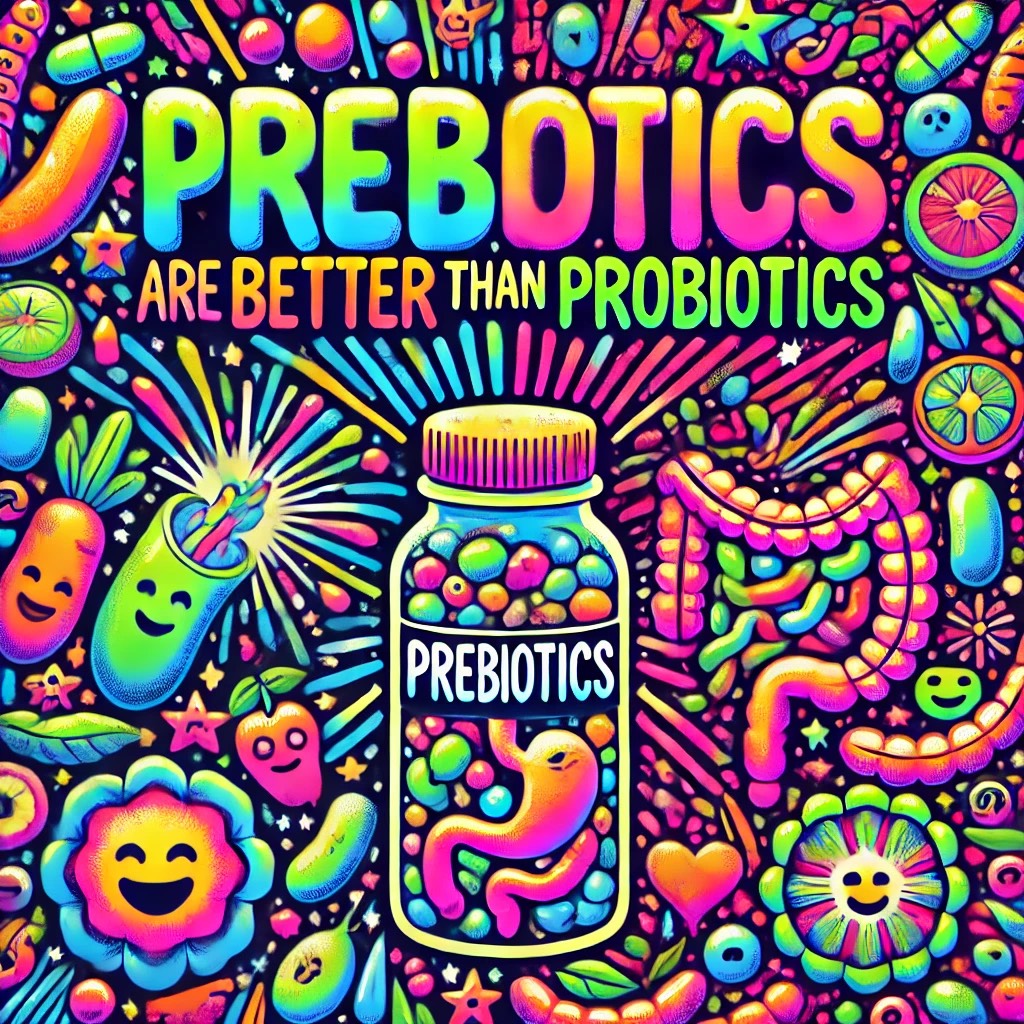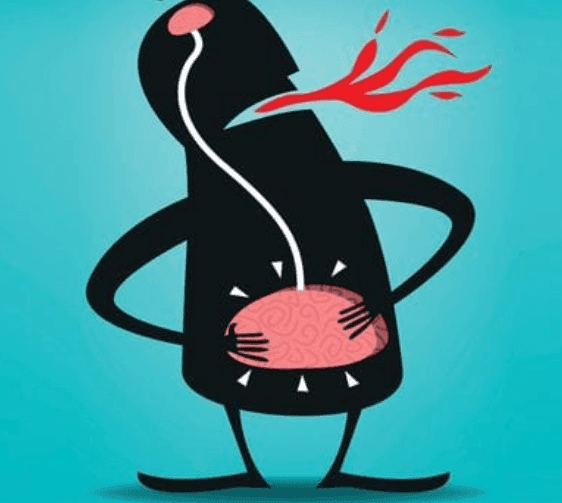Prebiotics are Better for Gut than Probiotics
 Probiotics have become very popular over the last decade. In fact, most people consider them the best natural way to improve gut health. Though probiotics can be very helpful, in my opinion, prebiotics are much better for you!
Probiotics have become very popular over the last decade. In fact, most people consider them the best natural way to improve gut health. Though probiotics can be very helpful, in my opinion, prebiotics are much better for you!
In this article, I will discuss why prebiotic supplements are more beneficial than probiotics. I will also cover my favorite prebiotic and probiotic supplements. This will give you all the information you need to restore your gut and improve your well-being.
Probiotics – The Real Story
Probiotics can be helpful, but if you don’t feed them what they need to grow, they won’t replicate. For example, taking bifidobacterium while on a carnivore diet is unlikely to increase your levels. In contrast, if you were taking bifido while eating a plant-based diet high in fiber, it may increase levels. In short, the success of the probiotic depends a lot on the diet because that is what supports the growth of the organisms you are introducing.
Another caveat with probiotics is that you never know what the quality of the strains will be. Many products I tried did not grow when I provided them with food and the right living environment. This makes me question if most of the probiotic supplements out there contain viable strains. In addition to this issue, there are plenty of other reasons that I prefer prebiotics. I will cover those in great detail in the section below.
11 Reasons Prebiotics are Better than Probiotics
Prebiotics Enhance Genes of Bacteria
Probiotics work by simply implanting bacteria and hoping the population grows in the gut. In contrast, prebiotics enhance the metabolic and replication rates of beneficial bacteria. By manipulating the genetic activity of the bacteria, it increases its ability to compete in the environment. It also improves the likelihood that the good bacteria will be highly active when foods are consumed. This means you would get the best digestion possible because the good bacteria would be highly active when the food was consumed. For this reason, they would dominate the digestive process instead of some less beneficial organism. As you can see, this is far different than simply implanting good bacteria and hoping it can survive.
Feed More Diverse Population of Bacteria
Probiotics typically increase the levels of only that specific species of bacteria. In contrast, many prebiotics feed a wide array of commensal bacteria. Though Lactobacillus and Bifidobacterium are extremely important, others also play a role in keeping your body healthy. This is why taking prebiotics is a better strategy in the long run.
Can Consume Much Larger Amounts than Probiotics
You can consume literally 100 times the volume of prebiotics than you can probiotics. In addition, you can vary your prebiotic supplements much more than you can probiotics. Less than 30 strains of probiotics are being sold on the market, while in contrast, there are hundreds of prebiotic substances. Focusing on prebiotics allows you to establish more diversity in your gut, which leads to better overall health.
Increases Production of Postbiotics
Postbiotics are substances produced by bacteria in your gut after they break down food or ferment a fiber. This molecule signals the immune system, letting it know if everything is OK. If the molecule is produced by a pathogenic bacteria, then the immune system responds by producing inflammatory molecules. If beneficial bacteria produce the byproduct, the immune system will send out anti-inflammatory molecules. This is how the gut bacteria signal the immune system.
No Quality Issues Since Not Dealing with Live Organisms
Most probiotics are not viable, live, or active. I have tried fermenting various probiotics, and only a few have grown. Since viability is an issue, you never know what effect it will have. Prebiotic quality does not vary as much because they are not alive. This ensures that you are accomplishing what you intend to.
Other Nutritional Benefits from Prebiotics
Many of these prebiotic substances also have tons of nutritional benefits. For example, cocoa powder is a prebiotic substance that helps Lactobacillus and Bifidobacterium grow. It also contains phytonutrients and other anti-inflammatory compounds. Another example is colostrum, which makes bacteria grow and contains various bioactive compounds that positively influence the immune system. The truth is, probiotics can’t provide the broad array of benefits that prebiotics can.
Never Know if Probiotic Will Actually Implant
Let’s be honest; most probiotics are probably killed by stomach acid. The ones that do survive still have to compete against all the other organisms in the gut. The reality is, very little of this probiotic actually cultures in your gut. If you have a chronic illness and your gut is already out of whack, even less of these probiotics are likely to survive. This is why prebiotics are a better choice. Stomach acid, pathogens, or other factors do not reduce their effectiveness.
Probiotics are just a Band-Aid or Temporary Solution
Studies have shown that after stopping probiotics for 21 days, your levels return to where they were before starting them. This means the probiotic is really nothing more than a Band-Aid. Prebiotics are not the same in this manner. Though the levels of beneficial bacteria declined after the prebiotic was stopped, some of the benefits were still retained.
Prebiotics can Selectively Target Good Bacteria
If you are low in a certain species of beneficial bacteria, you can take prebiotics that are proven to increase their growth. For example, if you are low in Bifidobacterium, you can take inulin or acacia to increase your levels. If you were deficient in Akkermensia, you could take grapeseed extract to dramatically increase your levels. These are just a few examples of how you can modify gut health selectively using prebiotics.
Prebiotics are More Histamine-Friendly
Very few strains of probiotics are histamine-friendly, which is a major issue for people with chronic inflammatory problems. In contrast, prebiotics typically have immune modulation properties that keep histamine levels lower. The immune system is much more likely to respond negatively to the introduction of bacteria than a fiber. Unless the bacteria has a clear immune modulating response, it has the potential to trigger highly reactive people.
Probiotics are More Expensive
You can get a pound of most prebiotic supplements for $20 or less. For a pound of probiotics, it would be ten times the amount at least. In addition, you never know how much of these probiotics are viable. The reality is, you get far more for your money when you start using prebiotics instead.
FAQ- Prebiotics vs. Probiotics
Are probiotics still worth taking?
Probiotics can be worth taking, but I would invest more time and money in prebiotics. For example, I would use one probiotic supplement while using five or six prebiotic supplements. Not only do you get more for the money with prebiotics, but the benefits are much broader.
What are the best probiotic strains for gut health?
My favorite probiotic species is Bifidobacterium! These guys are responsible for keeping your immune system calm, resisting pathogens, digesting carbohydrates, and suppressing inflammation. Other than bifido, I like the strains Lactobacillus rhamnosus and Plantarum. I also like Bacillus subtilis in certain situations. Keep in mind, brand is everything with these. If you have questions about what brands I prefer, get in touch.
What prebiotic supplements are the most helpful?
If you want to know about the best prebiotic supplements, look at my article, 22 Best Prebiotics. In this article, I review a long list of prebiotics and cover my personal favorites. I also provide plenty of other useful information about prebiotics.
How can I get prebiotics from my diet?
Prebiotics are in nearly every plant you can consume. Ideally, you want to eat 20 to 30 different types of plants to give yourself plenty of fiber variation. This variance in fiber feeds a wide variety of beneficial bacteria in your gut. These bacteria are responsible for calming your immune system and controlling your symptoms. When you think of probiotics, simply think of the word fiber. If you have a food that is high in fiber, chances are it is also good at feeding beneficial bacteria.
How many different prebiotics should I take?
A few would be OK to start with. The ones that I like most are apple pectin, acacia fiber, arabinogalactan and inulin. From there, you can add a few others and start a rotation where you take each product 4-5 times weekly. This would be the most effective way to use these things. You don’t have to consume them every day to make a difference.
When is the best time to take prebiotics?
If I take more than one prebiotic at a time, I put them in a smoothie. This works well for me. If you are using a prebiotic on its own, take it 30 minutes before a meal. This will make it most effective. Also, if you are using something like apple pectin, you have to blend it into something or put it in capsules. If you don’t, it will gel up too quickly.
Prebiotics are the Future – Probiotics are the Past
Probiotics can provide benefits, but their potential is limited. Though you shouldn’t completely ignore them, you must be cautious. Many of them do not have beneficial effects on inflammation. In addition, if you have a chronic illness, most strains have the potential to trigger the immune system.
If you want to take the smart approach, choose prebiotics. Remember, start slowly, gradually increase your doses, and diversify when ready. If you want to be really healthy, cycle several different prebiotics and eat mostly plants. This will make your gut microbiome ecstatic! In the end, that’s all that really matters. Keep your gut happy, and you will be too!
If you have questions about gut health or prebiotics, get in touch. I always enjoy sharing my experiences if it can be helpful.
Happy healing everyone!
Matt Nedin, B.S.
Certified Holistic Nutritionist
EndSickness, Founder
Phone: (734) 846-8619
WhatsApp: +`17348468619
Email: endsickness@gmail.com









